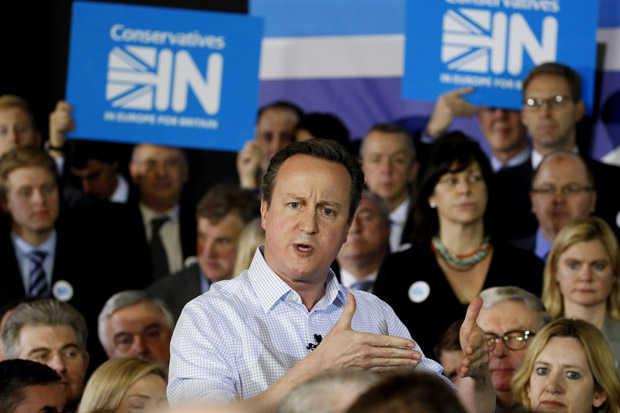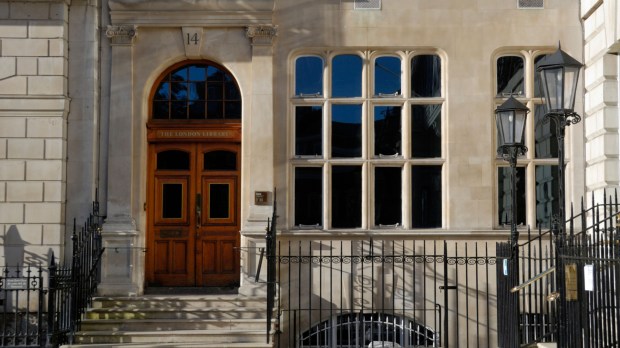One of the oddest features of the cabinet majority for staying in the EU is that almost no one in it admits to being a Europhile. How is it, then, that the very last-century ideas of Edward Heath, Ken Clarke, Michael Heseltine and Chris Patten can still exercise so much power over those who have so strongly and, in some cases, consistently criticised the EU in the past — Philip Hammond, Theresa May, Michael Fallon, Sajid Javid, Oliver Letwin, Liz Truss, Stephen Crabb, and, of course, David Cameron himself? Obviously one factor is that Tory MPs have found it convenient in recent years to adopt Eurosceptic protective colouring in their constituencies. But I think there is something deeper. The fear factor which may well win the referendum for Mr Cameron actually operates even more strongly on the elites than on the mass of the population. People who hold important jobs are much more worried than normal citizens about being considered ‘off the wall’. If they opt for ‘leave’, they will be interrogated fiercely by their peers about their decision. If they declare for ‘remain’, they will be left in peace. The EU is the biggest elite orthodoxy of the western world since we gave up our belief in imperialism. Most people within elites find it too tiring and dangerous to question the orthodoxy under which they have risen to the top.
Obviously the 198 business leaders who signed a letter to the Times on Tuesday explaining why Britain should remain in the EU are too busy and important to read what appears under their names, but surely someone in their enormous ‘comms’ teams should have pointed out to them that they were directly repeating David Cameron’s current slogan, ‘Britain will be stronger, safer and better off remaining a member of the EU.’ Might it not compromise their independence as top executives if they let words be put into their mouths by a politician? Irritated, I tried to order my stockbroker to divest my portfolio of all shares in all the companies concerned, but unfortunately found that I had not got any. By the way, Mr Cameron’s slogan has already changed. Until Sunday, it was ‘Britain will be stronger, safer and better off remaining in a reformed Europe’ but, as it has become clear that Europe will not be reformed at all, the last bit of the slogan has been quietly dropped. Keep a watch on it, in case ‘stronger’, ‘safer’ or ‘better off’ have also to be jettisoned in the coming weeks.
The next day in the Daily Telegraph, 13 former heads of the armed services also came out for ‘remain’. Their examples of successful collaboration with EU allies were two. The first was helping ‘to force the Iranians to the negotiating table through EU-wide sanctions’. That morning’s papers also reported that the Iranians have just offered a new bounty of $600,000 for anyone who kills Sir Salman Rushdie for writing The Satanic Verses. The other achievement of the EU allies, according to the ex-top brass, was making Vladimir Putin ‘pay a price for his aggression in Ukraine’. Yes, those were the best they could find.
It is wearisome work, but I hope the ‘leave’ campaign is carefully monitoring the BBC’s coverage of the referendum. On Monday, the first full weekday since Mr Cameron’s ‘legally binding’ deal, I listened to the Today programme for more than two hours. I heard six speakers for ‘remain’ and two (John Mills and Nigel Lawson) for ‘leave’. In this I am not including any of the BBC interviewers themselves, though my hunch, based solely on the way they ask questions, is that all of them, with the possible exception of John Humphrys, are for ‘remain’. The guests explicitly in favour of ‘remain’ were Carolyn Fairbairn, Sir Mike Rake, Stanley Johnson and Michael Fallon. Jonathan Portes, who is always presented by the BBC as a neutral expert, was actually pushing the EU cause. It is true that my sixth speaker, ‘John Bell of the Iona Community’, never mentioned the EU at all, but his Thought for the Day, like almost all his contributions to that curious slot, was about how ghastly the British are compared with everyone else, which is an underlying Euro-enthusiast dogma. Actually, I have serious doubts as to whether ‘John Bell of the Iona Community’ exists. My theory is that he has been invented by a rogue satirist — a sort of Sacha Baron Cohen — within the corporation to embody racist English stereotypes of dour, chippy Scotsmen whose main religious belief is that all Tories will go to Hell.
It is recognised that the era of television has made it well-nigh impossible in Britain and the United States for a balding leader to win an election if pitted against one with more hair — Callaghan/Foot/Kinnock v. Thatcher, George H.W. Bush v. Clinton, Hague/Howard v. Blair, McCain v. Obama. (The only exceptions I can think of derive from the power of incumbency — George W. Bush v. Kerry, Obama v. Romney.) Now the voters’ jaded palate seems to be no longer content with a full head of hair alone, but wants it to be strikingly memorable as well, not to say strange. Hence the rise of Boris Johnson and Donald Trump. Obviously Boris would beat Jeremy Corbyn on this account. If Mr Trump gets the Republican nomination, however, he will almost certainly face Mrs Clinton, who is in no way bald. The electorate will be in a quandary that may have to be resolved by the Supreme Court, which rises above such considerations. In 2000, the court awarded the presidency to George W. Bush, despite the fact that he had less hair than his opponent, Al Gore.
The last time the Queen travelled on the Tube before she opened the Elizabeth Line this week was in 1969, when she opened the Victoria Line. I vaguely remember that event, because the then-innovative automatic ticket machine spat out the coin which she had inserted. The rejected coin was, I think, a sixpence (2.5p). The (cash) price of a Zone One single today is £4.90.
REFERENDUM 2016: THE BATTLE AHEAD
Join Isabel Hardman, James Forsyth and Fraser Nelson at the ICA, near Trafalgar Square, to discuss the campaign with Ben Page, pollster at Ipsos Mori. A subscriber-only event. To book, click here. To subscribe from £1/week, click here.
Got something to add? Join the discussion and comment below.
Get 10 issues for just $10
Subscribe to The Spectator Australia today for the next 10 magazine issues, plus full online access, for just $10.
You might disagree with half of it, but you’ll enjoy reading all of it. Try your first month for free, then just $2 a week for the remainder of your first year.
















Comments
Don't miss out
Join the conversation with other Spectator Australia readers. Subscribe to leave a comment.
SUBSCRIBEAlready a subscriber? Log in